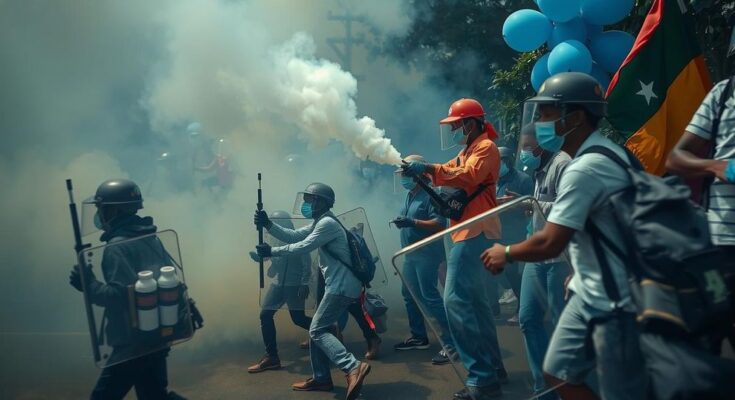Mozambique’s capital, Maputo, faced police action as large protests erupted over allegations of fraud following the October 9 elections won by the Frelimo party. Police used tear gas to disperse crowds supporting opposition leader Venancio Mondlane, who claims the vote was rigged. Amid rising violence and restrictions on protests, the international community remains concerned about human rights violations and the implications for Mozambique’s political stability.
Mozambique has recently witnessed significant civil unrest following the presidential elections held on October 9, which resulted in the Frelimo party extending its almost 50-year rule. The capital, Maputo, saw a prominent protest on Thursday against perceived electoral fraud, prompting police to employ tear gas in an effort to disperse crowds. Demonstrators, comprised predominantly of young men, set up burning barricades and displayed placards supporting opposition leader Venancio Mondlane, who has accused the government of electoral manipulation. Mondlane, currently located outside Africa for safety, claimed he was the rightful victor of the election and referred to this moment as critical for Mozambique’s political landscape. The police response included the excessive use of force, with tear gas deployed even against peaceful protesters. Reports indicate that at least 20 fatalities have occurred amid the protests, reflecting the heightened tensions surrounding the election results. Defence Minister Cristovao Chume insinuated that the military could be mobilized to maintain order, citing ongoing threats to established government power. The upcoming political transition, with President Filipe Nyusi due to step down, has intensified the political atmosphere as discussions arise about a possible government of national unity led by Mondlane. This has coincided with restrictions on internet access, perceived as an attempt to suppress dissent and protest against the regime, drawing international scrutiny and warnings regarding human rights violations.
The political landscape in Mozambique has been fraught with tension following its recent elections. The Frelimo party, which has held power since 1975, was declared victorious in the October 9 presidential election amidst allegations of fraud and electoral malfeasance. Public discontent has been exemplified through widespread protests, particularly among the youth, who accuse the ruling party of undermining democracy. Various organizations, including Amnesty International, have reported violence, deaths, and an aggressive police crackdown on dissent, raising concerns about human rights practices within the nation. The situation has garnered attention from international bodies, including the Southern African Development Community, which is seeking to address the unrest.
In conclusion, the protests in Mozambique signal significant unrest fueled by allegations of electoral fraud following the recent elections. With police resorting to tear gas and live ammunition against demonstrators, the situation remains volatile. The calls for government accountability and potential political change underscore the urgency of addressing the crisis, as international observers closely monitor the unfolding events. The ramifications of this unrest could reshape Mozambique’s political future, especially with potential changes in leadership on the horizon.
Original Source: www.aljazeera.com




